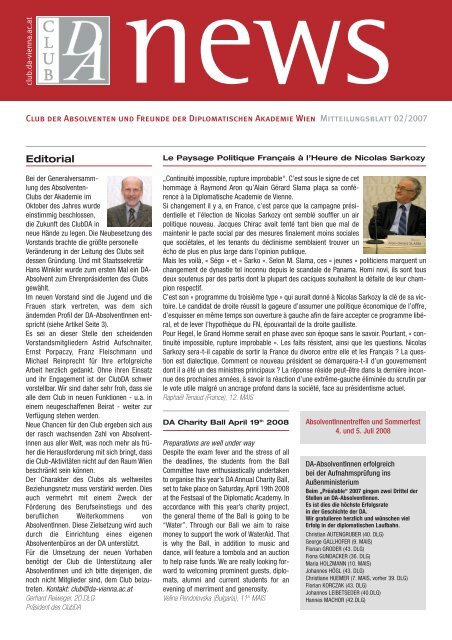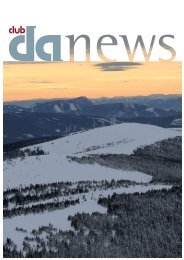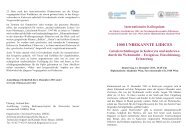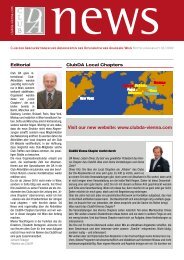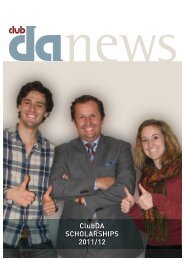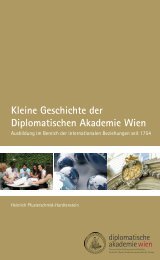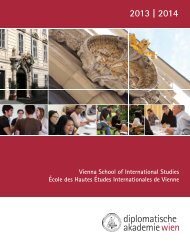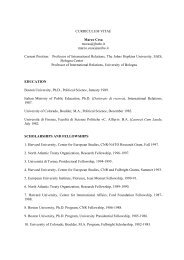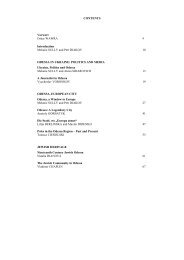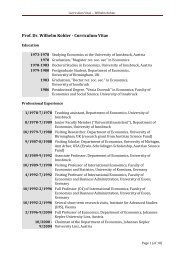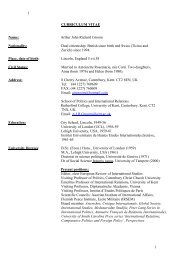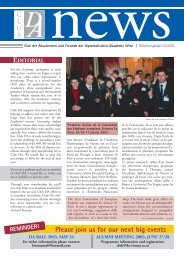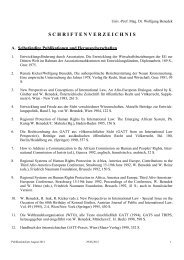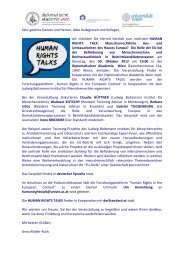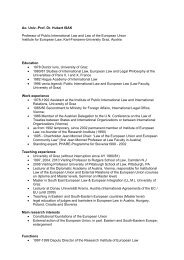DA News 2/2007 - Diplomatic Academy Vienna
DA News 2/2007 - Diplomatic Academy Vienna
DA News 2/2007 - Diplomatic Academy Vienna
Create successful ePaper yourself
Turn your PDF publications into a flip-book with our unique Google optimized e-Paper software.
club.da-vienna.ac.at<br />
Club der Absolventen und Freunde der Diplomatischen Akademie Wien Mitteilungsblatt 02/<strong>2007</strong><br />
Editorial<br />
Bei der Generalversammlung<br />
des Absolventen-<br />
Clubs der Akademie im<br />
Oktober des Jahres wurde<br />
einstimmig beschlossen,<br />
die Zukunft des Club<strong>DA</strong> in<br />
neue Hände zu legen. Die Neubesetzung des<br />
Vorstands brachte die größte personelle<br />
Veränderung in der Leitung des Clubs seit<br />
dessen Gründung. Und mit Staatssekretär<br />
Hans Winkler wurde zum ersten Mal ein <strong>DA</strong>-<br />
Absolvent zum Ehrenpräsidenten des Clubs<br />
gewählt.<br />
Im neuen Vorstand sind die Jugend und die<br />
Frauen stark vertreten, was dem sich<br />
ändernden Profil der <strong>DA</strong>-AbsolventInnen entspricht<br />
(siehe Artikel Seite 3).<br />
Es sei an dieser Stelle den scheidenden<br />
Vorstandsmitgliedern Astrid Aufschnaiter,<br />
Ernst Porpaczy, Franz Fleischmann und<br />
Michael Reinprecht für Ihre erfolgreiche<br />
Arbeit herzlich gedankt. Ohne ihren Einsatz<br />
und ihr Engagement ist der Club<strong>DA</strong> schwer<br />
vorstellbar. Wir sind daher sehr froh, dass sie<br />
alle dem Club in neuen Funktionen - u.a. in<br />
einem neugeschaffenen Beirat - weiter zur<br />
Verfügung stehen werden.<br />
Neue Chancen für den Club ergeben sich aus<br />
der rasch wachsenden Zahl von Absolvent-<br />
Innen aus aller Welt, was noch mehr als früher<br />
die Herausforderung mit sich bringt, dass<br />
die Club-Aktivitäten nicht auf den Raum Wien<br />
beschränkt sein können.<br />
Der Charakter des Clubs als weltweites<br />
Beziehungsnetz muss verstärkt werden. Dies<br />
auch vermehrt mit einem Zweck der<br />
Förderung des Berufseinstiegs und des<br />
beruflichen Weiterkommens von<br />
AbsolventInnen. Diese Zielsetzung wird auch<br />
durch die Einrichtung eines eigenen<br />
Absolventenbüros an der <strong>DA</strong> unterstützt.<br />
Für die Umsetzung der neuen Vorhaben<br />
benötigt der Club die Unterstützung aller<br />
AbsolventInnen und ich bitte diejenigen, die<br />
noch nicht Mitglieder sind, dem Club beizutreten.<br />
Kontakt: club@da-vienna.ac.at<br />
Gerhard Reiweger, 20.DLG<br />
Präsident des Club<strong>DA</strong><br />
news<br />
Le Paysage Politique Français à l’Heure de Nicolas Sarkozy<br />
„Continuité impossible, rupture improbable“. C’est sous le signe de cet<br />
hommage à Raymond Aron qu’Alain Gérard Slama plaça sa conférence<br />
à la Diplomatische Academie de Vienne.<br />
Si changement il y a, en France, c’est parce que la campagne présidentielle<br />
et l’élection de Nicolas Sarkozy ont semblé souffler un air<br />
politique nouveau. Jacques Chirac avait tenté tant bien que mal de<br />
maintenir le pacte social par des mesures finalement moins sociales<br />
que sociétales, et les tenants du déclinisme semblaient trouver un<br />
écho de plus en plus large dans l’opinion publique.<br />
Mais les voilà, « Ségo » et « Sarko ». Selon M. Slama, ces « jeunes » politiciens marquent un<br />
changement de dynastie tel inconnu depuis le scandale de Panama. Homi novi, ils sont tous<br />
deux soutenus par des partis dont la plupart des caciques souhaitent la défaite de leur champion<br />
respectif.<br />
C’est son « programme du troisième type » qui aurait donné à Nicolas Sarkozy la clé de sa victoire.<br />
Le candidat de droite réussit la gageure d’assumer une politique économique de l’offre,<br />
d’esquisser en même temps son ouverture à gauche afin de faire accepter ce programme libéral,<br />
et de lever l’hypothèque du FN, épouvantail de la droite gaulliste.<br />
Pour Hegel, le Grand Homme serait en phase avec son époque sans le savoir. Pourtant, « continuité<br />
impossible, rupture improbable ». Les faits résistent, ainsi que les questions. Nicolas<br />
Sarkozy sera-t-il capable de sortir la France du divorce entre elle et les Français ? La question<br />
est dialectique. Comment ce nouveau président se démarquera-t-il d’un gouvernement<br />
dont il a été un des ministres principaux ? La réponse réside peut-être dans la dernière inconnue<br />
des prochaines années, à savoir la réaction d’une extrême-gauche éliminée du scrutin par<br />
le vote utile malgré un ancrage profond dans la société, face au présidentisme actuel.<br />
Raphaël Tenaud (France), 12. MAIS<br />
<strong>DA</strong> Charity Ball April 19 th 2008<br />
Preparations are well under way<br />
Despite the exam fever and the stress of all<br />
the deadlines, the students from the Ball<br />
Committee have enthusiastically undertaken<br />
to organise this year’s <strong>DA</strong> Annual Charity Ball,<br />
set to take place on Saturday, April 19th 2008<br />
at the Festsaal of the <strong>Diplomatic</strong> <strong>Academy</strong>. In<br />
accordance with this year’s charity project,<br />
the general theme of the Ball is going to be<br />
“Water”. Through our Ball we aim to raise<br />
money to support the work of WaterAid. That<br />
is why the Ball, in addition to music and<br />
dance, will feature a tombola and an auction<br />
to help raise funds. We are really looking forward<br />
to welcoming prominent guests, diplomats,<br />
alumni and current students for an<br />
evening of merriment and generosity.<br />
Velina Pendolovska (Bulgaria), 11 th MAIS<br />
AbsolventInnentreffen und Sommerfest<br />
4. und 5. Juli 2008<br />
<strong>DA</strong>-AbsolventInnen erfolgreich<br />
bei der Aufnahmsprüfung ins<br />
Außenministerium<br />
Beim „Préalable“ <strong>2007</strong> gingen zwei Drittel der<br />
Stellen an <strong>DA</strong>-AbsolventInnen.<br />
Es ist dies die höchste Erfolgsrate<br />
in der Geschichte der <strong>DA</strong>.<br />
Wir gratulieren herzlich und wünschen viel<br />
Erfolg in der diplomatischen Laufbahn.<br />
Christian AUTENGRUBER (40. DLG)<br />
George GALLHOFER (9. MAIS)<br />
Florian GRODER (43. DLG)<br />
Fiona GUN<strong>DA</strong>CKER (36. DLG)<br />
Maria HOLZMANN (10. MAIS)<br />
Johannes HÖGL (43. DLG)<br />
Christiane HUEMER (7. MAIS, vorher 39. DLG)<br />
Florian KORCZAK (43. DLG)<br />
Johannes LEIBETSEDER (40.DLG)<br />
Hannes MACHOR (42.DLG)
1 st ETIA 11 th MAIS (2 nd year)<br />
Looking for a sustainable alternative?<br />
The timing seems to be just right to establish<br />
a new program at the <strong>DA</strong> in order to meet the<br />
increasing demand for young professionals in<br />
the environmental sector.<br />
”ETIA” – Environmental Technology and<br />
International Affairs is a new two years MSc<br />
postgraduate program targeting motivated<br />
grads from different backgrounds to be trained<br />
to operate in the interdisciplinary field of<br />
environmental protection and sustainable<br />
development. We spend the entire first year<br />
at the <strong>DA</strong> studying together with our colleagues<br />
from the other programmes and enjoying<br />
the <strong>DA</strong>’s cultural diversity before our<br />
small group moves on to the <strong>Vienna</strong><br />
University of Technology for the second year.<br />
What we are looking for is to acquire the<br />
broad political, legal, economic and technical<br />
knowledge required to make the right decisions<br />
in the complex field of environmental<br />
protection. We expect a very intense and customized<br />
practice-orientated training.<br />
Urban Jakob Peyker (Austria) 1 st ETIA<br />
44. Diplomlehrgang<br />
After having succeeded in a competitive<br />
entrance exam, 36 international students<br />
started this year’s 44th Diploma Programme<br />
with enthusiasm. The majority of the students<br />
are Austrians, but there are also students<br />
from other European countries, such as<br />
Germany, Italy, Belgium, Poland, Hungary and<br />
Croatia, as well as students from Senegal,<br />
Congo and China.<br />
The motivation for most of the students to do<br />
the DP of the <strong>Academy</strong> is the wish to get a job<br />
in their national foreign services or start a<br />
career in international organisations. There<br />
are even a few students already working at<br />
the foreign service of their countries.<br />
Alte Bekannte und Newcomers<br />
Die ersten paar Tage waren nicht die leichtesten.<br />
Da sich fast alle vom letzten Jahr kannten<br />
und sich Freundschaften entwickelt hatten,<br />
war es für uns 5 Leute, die direkt ins<br />
zweite Jahr des MAIS einsteigen durften,<br />
eine Herausforderung, den Anschluss zu finden.<br />
Aber dadurch, dass wir die Möglichkeit<br />
haben, die Bar zu nutzen und Partys zu veranstalten,<br />
gemeinsam das Mittagessen einzunehmen<br />
und natürlich die Vorlesungen zu<br />
besuchen, wurde uns das sich Bekanntmachen<br />
und Freundschaft schliessen um ein<br />
wesentliches einfacher gemacht.<br />
Auf jeden Fall hatten wir guten Anlass, uns in<br />
der Fertigkeit des in der internationalen<br />
Sphäre – wie wir alle wissen – unumgänglichen<br />
„Networking“ zu üben.<br />
Jasminka Kumbriç (Serbien) 11 th MAIS<br />
Students of the Diploma Programme profit<br />
not only from the course curriculum, profound<br />
language training in French and<br />
English and the possibility to learn languages<br />
like Chinese or Arab, but also benefit from the<br />
international environment. You can easily<br />
make friends from countries all over the<br />
world, so you can practise your language<br />
skills. The best meeting place is the bar at<br />
the <strong>Academy</strong>. After a long day, there is no<br />
better way to relax than to talk with some<br />
good friends in the bar.<br />
Johannes Strasser (Austria), 44. DLG<br />
12 th MAIS<br />
The academic year <strong>2007</strong>/08 sees the rebirth<br />
of the <strong>Diplomatic</strong> <strong>Academy</strong> of <strong>Vienna</strong>’s<br />
‘Special Programme in International Studies’<br />
as the first year of its biennial ‘Master of<br />
Advanced International Studies’ course. MAIS<br />
thus both explicitly prepares candidates for<br />
the more rigorous depth of analysis anticipated<br />
in MAIS II, the second year of the programme,<br />
as well as continuing, as SPIS did,<br />
to operate as a post-graduate programme in<br />
its own right. MAIS I supplements students’<br />
undergraduate experience with a grounding<br />
in the <strong>Academy</strong>’s four traditional disciplines<br />
of political science, economics, contemporary<br />
history and international and European<br />
law, as well as offering tuition in a variety of<br />
languages and focused studies on specific<br />
regions and issues of interest in international<br />
relations. MAIS I, as the largest and most<br />
diverse of the four programmes offered by<br />
the <strong>DA</strong>, with 29 countries and every continent<br />
represented by its 61 students, is arguably at<br />
the heart of the <strong>Academy</strong>’s academic mission.<br />
Ben White (U.K), 10 th MAIS<br />
Chaire Francophone<br />
Chaire Francophone de Sciences Politiques:<br />
la nouvelle touche ‘francophone’ de<br />
l’Académie Diplomatique de Vienne<br />
Dans le cadre de la nouvelle Chaire francophone<br />
Européenne de sciences politiques<br />
inaugurée cette année à l’Académie<br />
Diplomatique en collaboration avec<br />
l’Organisation Internationale de la<br />
Francophonie, le Professeur Christian Franck<br />
donnera des cours qui couvriront notamment<br />
la construction européenne, la politique extérieure<br />
de l’Union européenne, et les principaux<br />
aspects de la science politique. Étant<br />
depuis toujours fasciné par la thématique<br />
européenne et par ses dynamiques historiques<br />
et institutionnelles, je considère que<br />
cette nouveauté est une excellente contribution<br />
à notre formation multidisciplinaire et<br />
surtout, multilingue.<br />
Claudio Formisano (Italie), 12 th MAIS<br />
Cartoon von: Elisabeth Heigl (Austria), 43. DLG
Club<strong>DA</strong> Annual Meeting Charts the Way for the Future Students meet Graduates<br />
Far-reaching decisions were taken at the Club<strong>DA</strong> annual meeting that took place at the <strong>DA</strong> on<br />
October 19, <strong>2007</strong>:<br />
New Board Members<br />
Since Franz Fleischmann, Ernst Porpaczy and Astrid Aufschnaiter, founding members of<br />
Club<strong>DA</strong> and leading Board members for decades, had decided to step down, the Board was in<br />
for a major reshuffle. The Annual Meeting voted for a generation change and elected Gisela<br />
Heindl, Suman Lederer and Joshua Gernold as new board members. Elisabeth Slowiak, the<br />
first MAIS graduate on the Board, was promoted to the position of Vice President. Oliver Kitz<br />
replaced Michael Reinprecht as second Vice President.<br />
Honorary President<br />
Upon the Board’s initiative, State Secretary Hans Winkler was elected Honorary President of<br />
Club<strong>DA</strong>. Hans Winkler is the first <strong>DA</strong> graduate in that position. He succeeds former Austrian<br />
President and UN Secretary General Kurt Waldheim, who was a graduate of the old Consular<br />
<strong>Academy</strong>.<br />
Advisory Council<br />
Another important decision of the Annual Meeting was to create an Advisory Council which will<br />
assist the Board in the future. Franz Fleischmann and Michael Reinprecht were elected to be<br />
the Council’s first members. Membership in the Council expires after one year, but can be<br />
renewed by the Annual Meeting.<br />
Other issues that were taken up by the Annual Meeting were the financial situation of the Club,<br />
the status of membership and Club activities in <strong>2007</strong> and 2008.<br />
Club Finances<br />
Chief financial officer Reinhard Wind reported that the year of 2006 had been very successful<br />
with revenues comfortably surpassing expenditures. This leaves room for new Club activities<br />
and another Club<strong>DA</strong> scholarship.<br />
Membership<br />
Membership has increased by 15% since 1995, but is still not satisfactory with only 50% of<br />
<strong>DA</strong> graduates being members of Club<strong>DA</strong>. The Board’s proposal to launch a new membership<br />
drive was met with approval. The main focus will be on the graduates of the past 10 years who<br />
have benefited from the new efforts by <strong>DA</strong> to improve career services and alumni relations<br />
since the reform of 1996.<br />
Activities<br />
Club activities in <strong>2007</strong> included cultural events, a skiing weekend and meetings at the <strong>DA</strong>.<br />
There were two more issues of the Club<strong>DA</strong> <strong>News</strong> and an important new addition to the Club<strong>DA</strong><br />
website: a“Jobbörse” forum initiated by Josh Gernold. The traditional international alumni<br />
meeting in June again was a big success with more than 200 graduates and spouses attending.<br />
Major new projects in 2008 will be a relaunch of the Club<strong>DA</strong> website with a special focus on<br />
career services and a mentor programme, a series of alumni meetings in major cities outside<br />
<strong>Vienna</strong> and a new membership initiative.<br />
Jour Fixe<br />
In <strong>Vienna</strong>, alumni decided on the 3rd Thursday of each month as a Jour Fixe for their meetings.<br />
Gerhard Reiweger, 20 th DLG, President of Club<strong>DA</strong><br />
<strong>Diplomatic</strong> <strong>Academy</strong> Networking Forum<br />
As it proves ever more difficult to find meaningful, well paid work, even after having finished<br />
the <strong>DA</strong>, some recent graduates decided to get involved and help intensify the <strong>DA</strong>’s career services<br />
with two new additions to the <strong>DA</strong> Alumni Club website: the “<strong>DA</strong> Job-Börse” and <strong>DA</strong><br />
Mentor Program.<br />
The “<strong>DA</strong> Job-Börse” will contain job and internship postings that students and alumni can<br />
apply for. The majority of the postings will come from organisations and businesses where <strong>DA</strong><br />
Alumni work. The <strong>DA</strong> Mentor Program section of the Club website will contain a short biographical<br />
summary of each mentor with their contact details. This service will allow students to<br />
contact alumni to gain career ideas and tips. Currently, we already have 30 alumni mentors. If<br />
you are an alumnus and would also like to become a mentor, please contact Ira Stanic (ira.stanic@da-vienna.ac.at).<br />
If you have any questions regarding these initiatives, please do not hesitate<br />
to contact me (jger76@yahoo.com).<br />
Thanks for your help in making this a success!<br />
Josh Gernold (USA), 41 st DLG<br />
Interview mit Botschafterin<br />
Dr. Heidemaria Gürer,<br />
Ankara<br />
Frau Bot. Heidemaria Gürer<br />
absolvierte den 17. DLG an<br />
der <strong>DA</strong>, und spricht außer<br />
ihrer Muttersprache Deutsch<br />
auch fließend Türkisch,<br />
Russisch, Englisch und Französisch. Sie war bereits<br />
in Jugoslawien, Tschechoslowakei, Finnland auf<br />
Posten und war als „Roving Ambassador“ in<br />
Armenien, Aserbaidschan, Georgien, Kasachstan,<br />
Kirgisistan, Tadschikistan, Turkmenistan und<br />
Usbekistan akkreditiert. Zur Zeit ist sie Österreichische<br />
Botschafterin in der Türkei. Von der Vereinigung<br />
der ausländischen JournalistInnen in der Türkei und<br />
der Zeitschrift „True“ wurde Heidemaria Gürer zur<br />
„besten ausländischen Diplomatin“ <strong>2007</strong> gewählt.<br />
Welche Eigenschaften werden benötigt, um ein erfolgreicher<br />
Diplomat bzw. eine erfolgreiche Diplomatin zu<br />
werden?<br />
Offenheit, Ideenreichtum, Durchsetzungsvermögen,<br />
Ausdauer, rasche Auffassungsgabe, Verstehen anderer<br />
Kulturen und Mentalitäten, auch in schwierigen<br />
Situationen ruhig und besonnen bleiben, nicht leicht<br />
aufgeben.<br />
Wie hat Sie die Diplomatische Akademie auf Ihre<br />
erfolgreiche Karriere vorbereitet?<br />
Da ich weder ausgebildete Juristin noch Ökonomin bin,<br />
war der <strong>DA</strong>-Beitrag ein wesentlicher. VR und internationales<br />
Wirtschaftsrecht – beides für das Préalable<br />
wichtig – lernte ich im Wesentlichen an der <strong>DA</strong>.<br />
Verfolgen Sie die Entwicklungen an der <strong>DA</strong>? Haben Sie<br />
Kontakt mit Ihren ehemaligen <strong>DA</strong>-KollegInnen?<br />
Ich verfolge die Entwicklungen sehr genau, einige meiner<br />
Chefs im BMeiA waren auch <strong>DA</strong>-Direktoren. Enge<br />
berufliche Zusammenarbeit pflege ich mit dem stv.<br />
Direktor, Gerhard Reiweger. Ich halte auch Kontakt zu<br />
<strong>DA</strong>-KollegInnen, insbesondere innerhalb des BMeiA.<br />
Ich habe immer wieder Veranstaltungen aus meinem<br />
Zuständigkeitsbereich mit der <strong>DA</strong> durchgeführt und bin<br />
der <strong>DA</strong> sehr dankbar, dass sie auch Südkaukasien und<br />
Zentralasien, für welches früher in Österreich wenig<br />
Interesse bestand, von Anfang an unterstützt hat.<br />
Sie sind mit der Türkei durch Ihre Ehe auch persönlich<br />
eng verbunden; Sie werden als „Wiener<br />
Schwiegertochter der Nation“ bezeichnet. Erleben Sie<br />
das Land als Botschafterin anders? Welche Aspekte<br />
der Türkei gefallen Ihnen am meisten? Was ist Ihr<br />
Lieblingsprojekt in der Türkei, das Sie dort als<br />
Botschafterin verwirklichen möchten?<br />
Ich erlebe die Türkei sicherlich anders als solche<br />
BotschafterInnen, die die Türkei vorher nicht kannten.<br />
Die Einarbeitungszeit ist viel kürzer.<br />
Türkischkenntnisse sind ein enormer Vorteil – oftmals<br />
als „Türöffner“. Mir gefällt besonders die Vielfalt der<br />
Türkei – das große Land mit all den unterschiedlichen<br />
Naturschönheiten, kulturellen Akzenten und die heute<br />
vorherrschende Dynamik, sowie die geografische Lage<br />
der Türkei, die es zu einem so wichtigen Spieler in der<br />
Weltpolitik macht. Mein Ziel als Botschafterin in der<br />
Türkei ist es, ein möglichst dichtes Beziehungsnetz<br />
zwischen unseren beiden Staaten auf- und Vorurteile<br />
abzubauen. Österreich und die Türkei sollen in allen<br />
Bereichen gegenseitige Wissensdefizite ab- und<br />
Vertrauen aufbauen. Neben der für uns üblichen politisch-wirtschaftlichen<br />
Tätigkeit konzentriere ich mich<br />
dabei auf kulturelle Aspekte sowie Themen im Frauenund<br />
Rechtsbereich.<br />
Was würden Sie der nächsten Generation von<br />
Führungspersönlichkeiten empfehlen?<br />
Vielseitig sein, nichts als gegeben hinnehmen, immer<br />
neugierig sein und auch vor schwierig scheinenden<br />
Herausforderungen nicht zurückschrecken.<br />
Ich danke Ihnen sehr für dieses Interview.<br />
Suman Lederer (Indien), 10 th MAIS
Cartography<br />
Many are those who nod knowingly when they hear the word “Maastricht”. The town is indeed<br />
famous, for who would not know the treaty that was signed there? However, ask these same<br />
people to locate Maastricht on a map, and you might see them alternatively stumble and redden,<br />
shocked to discover that they are incapable of it. Which is sad because the location of places<br />
where important things happened often has political significance. It is worth the time to<br />
consult a map and find out.<br />
Maps, on the other hand, have their own problems and need to be read with understanding as<br />
every map is based on the political and ideological choices of the cartographer.<br />
In the corridors of the <strong>Diplomatic</strong> <strong>Academy</strong>, next to room H2, there is an upside-down map of<br />
the world. But does the Earth really have an "up" and a "down"? Is there really a place that<br />
must always be “at the left” of the map, and another that must be “at the right”?<br />
Geographically speaking, the center of the projection matters very little. So why are most maps<br />
based on the Mercator projection?<br />
The answer is indeed political: Though Europeans certainly did not make the first maps, they<br />
were the ones who explored, and ultimately dominated the world. And, as far as they were concerned,<br />
Europe was at the center of said world. And this view determines the shape of the<br />
maps we use to date.<br />
Another example of how maps are used to project political power is the fact that France declared<br />
the Sahara, an inhospitable, uninhabitable, arid zone a colony for no other reason than that<br />
it allowed the Empire to appear vaster.<br />
Would different maps change our view of<br />
the world? Well, just look at the significance<br />
a map with America at the center had in<br />
the days of the Cold War, when the splattering<br />
of enemy colors on both sides of the<br />
continent would certainly have increased<br />
concern, as the country would seem<br />
sorrounded.<br />
Iphigenia Moraitini (Greece), 11 th MAIS<br />
<strong>DA</strong> Student Initiative<br />
The <strong>Diplomatic</strong> <strong>Academy</strong> Student Initiative, more commonly known as <strong>DA</strong>SI, was founded by<br />
the students of the <strong>Diplomatic</strong> <strong>Academy</strong> in the academic year 2004-2005. The group provides<br />
a platform for students and alumni to produce and discuss thought-provoking ideas and gives<br />
them the opportunity to make a real contribution to a charity project. Since its inception <strong>DA</strong>SI<br />
has grown considerably as its activities multiply.<br />
In <strong>2007</strong>, a <strong>DA</strong>SI board, which includes the two course speakers of each promotion, was created.<br />
The board, which resembles a student council, is in charge of the overall organisation of<br />
events, oversees <strong>DA</strong>SI activities and facilitates communication with the administration. This<br />
year’s events are still in the early stages of planning. However, the students - by way of a very<br />
exciting decision process - have already selected “WaterAid” as this year’s charity project out<br />
of nine different options. The future of <strong>DA</strong>SI appears bright as its only limits are the students’<br />
imagination.<br />
Federico Barriga-Salazar (Ecuador), 11 th MAIS<br />
Editorial Team from left to right:<br />
Oumar Diallo (Austria), 12 th MAIS<br />
Iphigenia Moraitini (Greece), 11 th MAIS<br />
Suman Lederer (India), 10 th MAIS<br />
Impressum<br />
Herausgeber: Club der Absolventen und Freunde der<br />
Diplomatischen Akademie Wien<br />
club@da-vienna.ac.at<br />
www.club.da-vienna.ac.at<br />
Erscheinungsort: Wien<br />
Für den Inhalt verantwortlich: Gerhard Reiweger<br />
Redaktion: Oumar Diallo, Suman Lederer<br />
und Iphigenia Moraitini<br />
Grafik: Peter Zolly<br />
Skizzen aus dem Bräunerhof<br />
Wie es einem Studenten beim Besuch eines<br />
Wiener Kaffeehauses ergeht<br />
Ich trete ins Bräunerhof ein. Des Dunstes auf<br />
meiner Brille und des Rauchqualms wegen<br />
sehe ich weder, wo ich bin, noch wo ich hingehen<br />
muss.<br />
Sitzend warte ich auf den Kellner. Er geht<br />
zum dritten Mal vorbei. Ich starre nun auf<br />
einen Sprung des Marmortisches. Er bringt<br />
mir das silberne Tablett mit einem grünen Tee<br />
und einem Glas Wasser. Jetzt habe ich keinen<br />
Platz mehr, um zu schreiben. Eine ältere<br />
Dame mit Pelzmantel tritt ins Kaffeehaus ein.<br />
Sie bemerkt das Handzeichen einer anderen<br />
Dame und wendet sich zu diesem Tisch. Ein<br />
sehr gut angezogener alter Mann steht auf<br />
und hilft der älteren Dame, ihren Pelzmantel<br />
auszuziehen. Sie dankt ihm mehrmals, beide<br />
setzten sich und werden nicht mehr miteinander<br />
reden. Der Kellner geht vorbei und<br />
übersieht die beiden japanischen Touristen,<br />
die zahlen möchten. Thomas Bernhard hängt<br />
an der Wand in der Sonne und wird immer<br />
blässer. Endlich ist die Kronenzeitung frei.<br />
Der etwa 65-jährige Mann steht auf, bringt<br />
die Presse zurück und bemächtigt sich des<br />
Boulevardblattes. Der Kellner lässt einen<br />
Löffel fallen.<br />
Zwei 25-jährige Freundinnen gehen ein<br />
Stück Apfelstrudel auswählen. Ein 20-jähriger<br />
Bub versucht sein Buch weiter zu lesen,<br />
ist jedoch von der Erzählung wegen der<br />
Blondhaarigen mit dem Apfelstrudel abgelenkt.<br />
Ich schreibe weiter und hoffe, dass die<br />
schwarzhaarige Freundin von einem künftigen<br />
Schriftsteller beeindruckt sein wird.<br />
Vier Personen kommen rein. Die in der Nähe<br />
des Eingangs sitzenden Gäste schauen sie<br />
tadelnd an. Sie sprechen deutsch aus dem<br />
Norden.<br />
Alle Tische sind besetzt. Erfreut sehen die<br />
Kaffee- und Teetrinker, wie die vier<br />
Deutschen hinter dem Tuch vor der Schwelle<br />
verschwinden.<br />
Ein 40-jähriger Mann holt die Frankfurter<br />
Allgemeine Zeitung, wird dann die Zeitung<br />
auf der Sitzbank neben sich liegen lassen,<br />
ohne sie ein einziges Mal wieder zu berühren.<br />
Der Kellner geht vorbei und bringt die FAZ zu<br />
den anderen Zeitungen zurück.<br />
Die beiden Mädchen mit dem Apfelstrudel<br />
ziehen sich für die Kälte an und verlassen<br />
den Raum.<br />
Der Bub mit dem Buch ist wieder abgelenkt<br />
und, wie ich, enttäuscht.<br />
Ich trinke meinen grünen Tee aus und warte.<br />
Der Kellner kommt und kassiert schnell.<br />
Seine Miene missbilligt mein Trinkgeld.<br />
Draußen ist es schon dunkel.<br />
Luc Hermann (Belgien), 44. DLG


